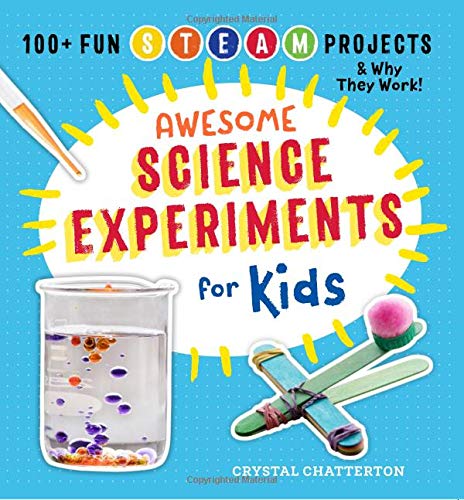On this page: General Resources
chemistry pages
general resources
📃 Elementary Lab-Based Physical Science from Best Homeschool Resources. For a hands-on approach to homeschool science, check out our new Lab-Based Guide to Physical Science (PDF). This free, flexible guide is divided into six units and corresponds to a year-long integrated Physical Science study of topics across Chemistry and Physics. – Elementary
🖐️ Periodic Table. A Periodic Table of the Elements is a must-have supplement to a home study of Chemistry. There are many options available—the linked version is for a 23” x 33” laminated poster that contains a good amount of extra information, including the element’s natural state (solid, liquid, gas), electronegativity, and electrons per level. – All
📖 Chemistry: Getting a Big Reaction by Simon Basher. Written in a blurby format, Basher's Chemistry uses anthropomorphization to explain key chemical concepts, including states of matter, acids and bases, and Brownian motion. – Elementary • Middle
📖 Chemistry for Every Kid: 101 Easy Experiments that Really Work by Janice Van Cleave. This entry in Van Cleave’s Every Kid series introduces kids to fundamental concepts in Chemistry (and Physics) through hands-on experimentation. Units 1 and 5 cover Matter (density, states of matter, phase changes). The experiments in Units 4 and 8 focus on Chemical Reactions (change and acid-base chemistry), and Unit 6 covers Water and Solutions. Units 2, 3, and 7 touch on topics at the intersection of Physics & Chemistry: Forces, Gases, and Heat. – Elementary
📖 Awesome Science Experiments for Kids by Crystal Chatterton. This terrific book features over 100 projects divided into six chapters. The layout is visually appealing, the experiments are well-conceived, and the “Hows and Whys” section clearly explains the scientific reasoning behind the results. – Elementary
📖 Middle School Chemistry from ACS. Two features recommend this experiment-based textbook: it's geared toward middle grade students, and it's free. Download the PDF from the American Chemical Society website. The six chapters cover Matter (states of matter, density, and changes of state), Atoms and Molecules (periodic table and bonding), Water & Solutions (water and dissolving), and Chemical Reactions (chemical change). The simple experiments can be easily done at home. Supplement with other resources for a well-rounded introduction to general chemistry. – Middle
📖 CK-12 Physical Science for Middle School. If you’re looking for a middle school spine, one option is CK-12 Physical Science. This free, online modular textbook combines a middle school study of Physics and Chemistry. Chemistry-based modules cover matter, chemical bonding, chemical reactions, atoms and elements, the Periodic Table, solutions, acids and bases, nuclear chemistry, and more. – Middle
📖 Chemistry: The Central Science by Theodore Brown. Here is a well-respected, AP-aligned high school general chemistry textbook. This is a good choice for students who are interested in eventually pursuing science at the college level. The latest edition is quite pricey; however, older editions are still perfectly valid and can be purchased used on Amazon. The Solutions manual must be purchased separately; be sure to find the correct version to accompany your textbook. – High
🖐️ Illustrated Guide to Home Chemistry Experiments by Robert Bruce Thompson. If you’re planning to incorporate home labs into your high school chemistry study, then this excellent guide is a must-have resource. Find tons of great labs correlating with every area of general chemistry study, along with recommendations for equipment purchases, safety notes, background information, and more. Very highly recommended. – High
💻 American Association of Chemistry Teachers. AACT has a library of simulations that correlate with many topics in chemistry, from intermolecular forces to isotopes to reaction rates. – High
💻 Citizen Science. Citizen Science projects allow members of the public to contribute to ongoing scientific research. Some initiatives have a local focus, while others are conducted nationwide or online. Search the SciStarter database to find projects appropriate for your child’s age; typical Chemistry-based projects include growing crystals using readily available materials and measuring vitamin C in food. – All
💻 Steve Spangler Science. Steve Spangler is something of a science demo celebrity. On his website, you will find many scientific demonstrations, videos, and experiments, some more complex than others. As you browse the Chemistry pages of Best Homeschool Resources, you will find recommendations for experiments that align with specific areas of study. – All
▶️ Envisioning Chemistry from Beauty of Science. “Envisioning Chemistry is an online exhibition that blends chemistry and art, revealing the beauty of chemistry through special techniques such as microphotography, time-lapse photography, and infrared thermal imaging.” Check out the individual Chemistry pages to find films that correlate with specific areas of study or browse the entire playlist below. (Click the three horizontal bars in the upper right corner of the video screen below to select any video in the series.) – All
▶️ Crash Course Chemistry. Narrated by Hank Green, this series is definitely geared toward upper high school students, although some of the videos could be used to supplement an upper Middle School Chemistry study. Just keep in mind that High School Chemistry goes into much more depth—many of the topics covered in this series aren’t typically addressed at the middle school level at all. (Click the three horizontal bars in the upper right corner of the video screen below to select any video in the series.) – Middle • High

















